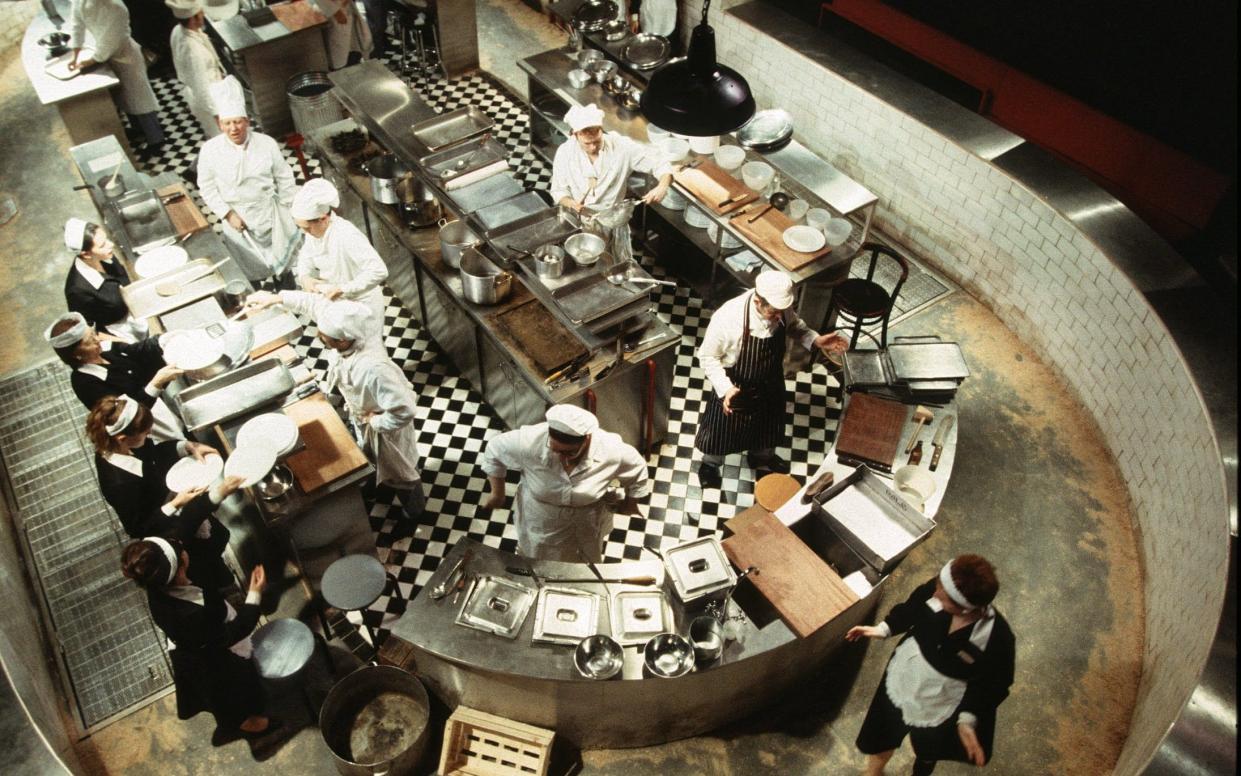The forgotten play that fed drama’s kitchen nightmares

If ever there was a profession that was ripe for dramatisation, it’s the restaurant business. Doctors and detectives may be more ubiquitous on our TV screens and in cinemas, but the blood-boiling pressure of the high-end restaurant, the egos of head chefs and the confrontational nature of some clientele make it an arena that makes the house of Atreus look positively benign.
Recently, there have been films and TV series that fully mined the almost operatic intensity of professional catering. There is The Bear, currently on Disney +, which stars Jeremy Allen White as a chef of international renown, who is forced to take over his brother’s sandwich shop.
In the UK, Stephen Graham’s Boiling Point, a one-take wonder in which the actor plays the boss of a pukka establishment which is hanging on by the skin of its teeth, was so adored that it is now being made into a TV series. Also on TV is Mammals, starring James Corden as a loutish chef with several Michelin stars but little in the way of self-awareness. Last weekend sees the release of The Menu, an enjoyably OTT sort of satire with Ralph Fiennes as a pretentious culinary star which takes potshots at the sort of restaurants where food is to be drooled over rather than enjoyed.
We are no strangers to kitchen nightmares, of course. Television competitions such as MasterChef and The Great British Bake Off, while supposedly friendly in their intentions, do little to hide us from the high-pressure horrors of cooking to perfection. Meanwhile, our perception of the hot-headed, temperamental chef has been pretty much set in stone by the on-screen persona of Gordon Ramsay over various series.
Yet, in terms of drama, the cupboard has been surprisingly bare up to now. The most famous example is probably the big-hearted Big Night (1996), a life-affirming comedy drama with Stanley Tucci and Tony Shalhoub as two Italian brothers trying to save their New York restaurant from going under. The comic potential of the kitchen has been explored in sitcoms such as Chef! with Lenny Henry, and Whites with Alan Davies, but neither made a lasting impression. This is strange, but I wonder if it is something to do with the fact that chefs are not, in the public psyche, particularly sympathetic creatures. We think of red-faced men perhaps thwarted by their own perfectionism, barking orders, berating their staff.
If there is a true ancestor to the restaurant as horror show premise we are currently enjoying, we need to go back 63 years to the Royal Court Theatre and Arnold Wesker’s The Kitchen. Wesker was establishing himself at the heart of Britain’s theatrical revolution – his play Roots about an uneducated young woman’s journey to self expression, had perfectly captured the air of unease and boundaries which would finally be broken in the subsequent decade.
The Kitchen proved that he was a master of social observation and this play, set behind the scenes of an enormous West End restaurant, was radical in showing the realities of work (previously this had been idealised) as the orders pile up and the harassed staff (a melting pot of people from across Europe) have to deal with multiple orders for fish, cutlets, omelettes and fruit flans. “Fifteen hundred customers an’ half of them eating fish. I had to start work on a Friday,” says Peter, the manic Germanic head of boiled fish. Kevin, in charge of fried fish, dreams of sleep.
The restaurant industry was very different in 1959. While haute cuisine could be found in London’s West End, we were still caught in the grey, unedifying world of post-rationing, and for most, the idea of eating out was confined to the cosy comfort of poached eggs on toast at a Lyons tea house. The Kitchen was not really about the food, as Wesker himself said: “The quality of food here is not so important as the speed with which it is served.”
Indeed, what Wesker captures so effectively is the fact that restaurant workers have to carry out their duties at break-neck speed, that precision is crucial, and any misstep of timing can spell disaster. He also managed to predict the future in the sense that all the characters are in danger of being defined by their work – something which we, in our stress-induced times, can all identify with.

Despite its workaday setting, The Kitchen has a larger-than-life quality to it – something which has been made manifest in The Menu where food is theatre, its creator a malevolent sort of puppetmaster. In the build up to the denouement of Part One, Wesker’s script suggests that “the final frenzy can be stylised”, as the waitresses move around the chefs shouting out the same sequence of orders and “the hum of the oven builds and the lights hanging over the ovens burn with increasing intensity to a white light…”
The stress of working in such a pressure cooker environment is never better articulated than by Peter. “Someone orders an onion soup and you put soup and bread and cheese in a tin to grill – jump! Then someone orders ham and egg in another tin - jump! Then someone orders an omelette and you jump to mish that… You go up you go down, you jump here you jump there, you sweat till steam comes off your back…”
In fact, Peter’s near delirious rant (he later picks up a meat axe and starts stabbing at the gas lead) not only captures the hamster-wheel effect. It also highlights the idea of the kitchen as the location of a neverending ritual, somewhere from which the workers can never escape. Far from being a place where delicious fantasies are baked, Wesker was the first to realise that the kitchen is where our darkest fears can be unleashed.
The Menu is in cinemas now


